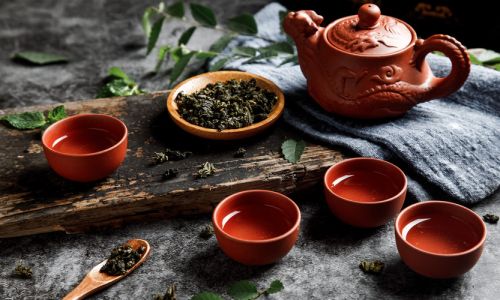Introduction
Tea, a beverage steeped in history and tradition, has transcended cultural boundaries to become one of the most consumed drinks worldwide. From the bustling tea houses of China to the refined afternoon rituals in British parlors, this humble infusion has captivated hearts and minds for millennia. Yet, beyond its cultural significance, tea has emerged as a subject of intense scientific scrutiny, with researchers uncovering a treasure trove of health benefits. This article delves into the science behind tea’s therapeutic properties, exploring how its bioactive compounds contribute to physical well-being, mental clarity, and longevity. From antioxidant-rich green tea to the robust flavors of black tea, each variant offers a unique profile of nutrients that may hold the key to preventing chronic diseases and enhancing quality of life.
Antioxidant Powerhouse: Combating Oxidative Stress
Tea leaves, particularly those of the Camellia sinensis plant, are rich in polyphenols—a class of antioxidants that neutralize free radicals, unstable molecules linked to cellular damage and aging. Green tea, minimally processed to retain its natural compounds, boasts the highest concentration of catechins, with epigallocatechin gallate (EGCG) being the most potent. These antioxidants scavenge free radicals, reducing oxidative stress and inflammation, which are underlying factors in conditions like cancer, diabetes, and cardiovascular disease.

Studies suggest that regular tea consumption may lower the risk of chronic illnesses by up to 31%, according to a meta-analysis published in the European Journal of Clinical Nutrition. Black tea, while oxidized, retains its own set of theaflavins and thearubigins, which exhibit anti-inflammatory and cholesterol-lowering effects. Oolong and white tea, with their distinct fermentation processes, offer intermediate levels of these compounds, providing a spectrum of antioxidant benefits tailored to individual preferences.
Heart Health Guardian: Protecting the Cardiovascular System
Cardiovascular diseases remain the leading cause of death globally, but tea consumption may offer a defensive shield. Research indicates that polyphenols in tea improve endothelial function—the health of the inner lining of blood vessels—thereby enhancing blood flow and reducing hypertension. A 2020 study in the American Journal of Clinical Nutrition found that individuals consuming three cups of tea daily had a 20% lower risk of heart attack and stroke compared to non-tea drinkers.
The flavonoids in tea also contribute to lower LDL (bad) cholesterol levels while elevating HDL (good) cholesterol. This dual action prevents plaque buildup in arteries, a precursor to atherosclerosis. Furthermore, tea’s mild diuretic properties aid in reducing blood pressure, making it a complementary addition to heart-healthy lifestyles.
Brain Booster and Cognitive Enhancer
The synergy between caffeine and L-theanine, an amino acid unique to tea, creates a state of alert calmness. While caffeine enhances focus and reaction time, L-theanine promotes relaxation without drowsiness, fostering a balanced cognitive state. This combination may explain why tea drinkers often report sustained attention and creativity without the jitters associated with coffee.
Long-term neuroprotective effects are equally compelling. Population studies, such as the Singapore Chinese Health Study, reveal that regular tea consumption correlates with a 50% reduced risk of cognitive decline in older adults. The polyphenols in tea are believed to inhibit amyloid plaque formation, a hallmark of Alzheimer’s disease, while promoting the growth of new brain cells.
Metabolism and Weight Management
For those seeking natural aids in weight management, tea offers a compelling ally. Green tea extract, rich in EGCG and caffeine, has been shown to increase metabolic rate by 4–5%, facilitating fat oxidation. A 2014 review in The Journal of Research in Medical Sciences highlighted that green tea consumption led to modest but significant reductions in body weight and waist circumference over 12 weeks.
Black tea, though less studied in this context, may also contribute to weight regulation through its polyphenols, which modulate gut microbiota composition. A healthier gut microbiome enhances nutrient absorption and reduces inflammation, indirectly supporting weight loss efforts.
Stress Reducer and Mood Enhancer
In an era of chronic stress, tea provides a soothing ritual with measurable psychological benefits. L-theanine increases GABA levels in the brain, a neurotransmitter associated with relaxation, while reducing excitatory neurotransmitters like glutamate. This biochemical balance mitigates anxiety and promotes mental clarity.
A 2017 study in Nutrients found that participants who consumed black tea daily experienced a 47% reduction in cortisol levels following a stressful task compared to a placebo group. The act of brewing and sipping tea mindfully may also amplify these effects, fostering mindfulness and emotional resilience.
Immune System Support
Tea’s polyphenols exhibit antimicrobial properties, aiding the immune system in warding off infections. Catechins can inhibit the growth of pathogens like Streptococcus mutans, responsible for dental cavities, and Helicobacter pylori, linked to stomach ulcers. During flu season, tea drinkers may benefit from these antiviral effects, as seen in a 2018 study where green tea extract reduced influenza A virus replication by 80%.
Moreover, tea’s role in modulating immune cell activity—such as increasing T-cell production—strengthens the body’s defense mechanisms. Regular consumption may thus reduce the severity and duration of common colds.
Bone Health and Osteoporosis Prevention
Contrary to the diuretic effects of coffee, tea consumption is associated with improved bone density. A 2022 study in Osteoporosis International reported that postmenopausal women who drank tea had a 30% lower risk of hip fractures. The fluoride in tea leaves strengthens enamel and bone mineral density, while polyphenols reduce oxidative stress on bone cells.
This benefit is particularly significant for aging populations, where osteoporosis poses a substantial health risk. Incorporating tea into daily routines may offer a simple yet effective preventive measure.

Oral Health Ally
Tea’s antimicrobial properties extend to oral hygiene. Polyphenols inhibit the adhesion of plaque-forming bacteria to teeth, reducing the risk of cavities and gum disease. A 2021 study in the Journal of Dental Research found that green tea rinse decreased gingival bleeding by 22% in participants with mild periodontitis.
Additionally, tea’s natural fluoride content reinforces tooth enamel, providing a dual defense against decay. Opting for unsweetened tea avoids the sugar-related risks of acidic beverages, making it a smart choice for dental health.
Longevity and Anti-Aging
The cumulative effects of tea’s antioxidants and anti-inflammatory compounds may contribute to longer, healthier lives. Populations with high tea consumption, such as the Okinawans in Japan, boast disproportionate numbers of centenarians. A 2020 study in The Lancet tracked over 100,000 adults and found that tea drinkers had a 14% lower mortality rate over eight years, primarily due to reduced cardiovascular and respiratory deaths.
Telomeres, the protective caps on chromosomes that shorten with age, are longer in regular tea drinkers, according to a 2019 study in European Journal of Preventive Cardiology. This suggests that tea’s bioactive compounds slow cellular aging, preserving youthful function.
Cancer Risk Reduction
While no single food prevents cancer, tea’s polyphenols show promise in inhibiting carcinogenesis. EGCG induces apoptosis (cell death) in cancerous cells while sparing healthy ones, as demonstrated in laboratory studies on breast, prostate, and colorectal cancers. A 2022 meta-analysis in Cancer Epidemiology, Biomarkers & Prevention noted a 15% lower risk of colorectal cancer in tea drinkers.
Black tea’s theaflavins also exhibit chemopreventive effects, particularly against lung and ovarian cancers. Though more research is needed, integrating tea into a balanced diet may offer a layer of protection against malignancies.
Diabetes Management
Tea consumption correlates with improved insulin sensitivity and lower type 2 diabetes risk. A 2019 study in Diabetologia tracked 500,000 adults and found that daily tea drinkers had an 18% lower diabetes incidence. Green tea’s EGCG enhances glucose uptake by muscles, reducing blood sugar spikes after meals.
Black tea, with its theaflavins, also improves pancreatic beta-cell function, which is crucial for insulin production. For those with diabetes, unsweetened tea serves as a zero-calorie, nutrient-rich alternative to sugary beverages.
Hydration and Skin Health
Despite containing caffeine, tea contributes to daily fluid intake without causing dehydration. Herbal teas, which are caffeine-free, offer additional hydration benefits. Proper hydration maintains skin elasticity and flushes toxins, contributing to a radiant complexion.
Topically, green tea extracts are used in skincare products for their anti-inflammatory and UV-protective effects. A 2020 study in Journal of the American Academy of Dermatology found that green tea polyphenols reduced sunburn severity by 30% when applied before sun exposure.
Cultural and Social Dimensions
Beyond its physiological benefits, tea fosters connection and mindfulness. Tea ceremonies in Japan, China, and Morocco emphasize presence and gratitude, practices linked to reduced stress and improved mental health. Sharing a pot of tea with friends or family strengthens social bonds, which are vital for emotional well-being.
Conclusion
Tea’s journey from ancient medicinal herb to global beverage icon reflects its enduring appeal and multifaceted benefits. From safeguarding heart health to sharpening cognitive function, each sip offers a dose of nature’s pharmacy. As research continues to unravel its complexities, one truth remains clear: tea is more than a comforting ritual—it is a testament to the healing power of plants. Whether enjoyed in solitude or shared among companions, this humble leaf invites us to savor not just its flavor, but the promise of a healthier, longer life.






0 comments